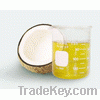الوصف
Coconut oil can be extracted through "dry" or "wet" processing.
Dry processing requires the meat to to be extracted from the
shell and dried using fire, sunlight or kilns to create copra.[2]
The copra is pressed or dissolved with solvents, producing the
coconut oil and a high protein, high fiber mash. The mash is of
poor quality for human consumption and is instead fed to
ruminants; there is no process to extract the protein from the
mash. The preparation and storage of copra often occurs in
unhygienic conditions which results in a poor quality oil that
requires refining before consumption. A considerable portion of
the oil extracted from copra is lost due to spoilage, consumption
by insects and rodents, and during the extraction process. All
"wet" process involves raw coconut rather than dried copra, using
the protein in the coconut to create an emulsion of the oil and
water. The more problematic step is breaking up the emulsion to
recover the oil. Originally this was done through lengthy
boiling, but this produces a discolored oil and is not
economical; modern techniques uses centrifuges and various
pre-treatments including cold, heat, acids, salts, enzymes,
electrolysis, shock waves, or some combination of them. Despite
numerous variations and technologies, wet processing is less
viable than dry processing due to a ****5% lower yield, even
compared to the losses due to spoilage and pests with dry
processing. Wet processes also requires an expensive investment
of equipment and energy, incurring high capital and operating
costs.[3]
Proper harvesting of the coconut (the age of a coconut can be 2
to *0 months when picked) makes a significant difference in the
efficacy of the oil making process and the use of a centrifuge
process makes the best final extracted product. Copra made from
immature nuts is more difficult to work with and produces an
inferior product with lower yields.[4] Conventional coconut oil
uses hexane to extract up to *0% more oil than just using rotary
mills and expellers. The oil is then refined to remove certain
free fatty acids, in order to reduce susceptibility
rancidification. Other processes to increase shelf life include
using copra with a moisture content below 6%, keeping the
moisture content of the oil below 0.2%, heating the oil to
**0–**0 °C (**6–**2 °F) and adding salt or citric acid.[5] Virgin
coconut oil (VCO) can be produced from fresh coconut meat, milk
or residue. Producing it from the fresh meat involves removing
the shell and washing, then either wet-milling or drying the
residue and using a screw press to extract the oil. VCO can also
be extracted from fresh meat by grating and drying it to a
moisture content of ****2%, then using a manual press to extract
the oil. Producing it from coconut milk involves grating the
coconut and mixing it with water, then squeezing out the oil. The
milk can also be fermented for ****8 hours, the oil removed and
the cream heated to remove any remaining oil. A third option
involves using a centrifuge to separate the oil from the other
liquids. Coconut oil can also be extracted from the dry residue
left over from the production of coconut milk.
| بلد: |
Malaysia |
| نموذج رقم: |
c
|
| سعر فوب: |
(قابل للتفاوض)
أحصل على آخر سعر
|
| الموقع: |
Malaysia |
| سعر الحد الأدنى للطلب: |
- |
| الحد الأدني للطلب: |
60 Metric Ton |
| تفاصيل التغليف: |
Drums, Flexi tant, Liters, pet bottles and bulk, etc. |
| موعد التسليم: |
7-30 days |
| القدرة على التوريد: |
85000 Metric Ton per Month |
| نوع الدفع: |
T/T, Western Union, Money Gram |
| مجموعة المنتج : |
- |

